Politics
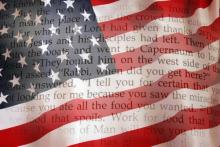
Both religion and politics are concerned with how we should organize societies. Yet the tendency for Christians has often been to begin with the politics and work backwards to find religious rationale for our political beliefs. As a result, most people read the Bible not to challenge our deeply held beliefs, but to affirm the decisions we've already made with our lives.
If you tend toward the political right you might say the chief political concern of the Scriptures has as much to do with smaller government, lower taxes, individual freedoms and gun rights as any explicit Christian concept.
If you tend toward the political left you might believe the chief political concern of the Scriptures has more to do with reproductive rights, religious pluralism, big government and labor unions.
Too often the ideologies of the secular right or the political left have been allowed set the terms for religious Christians.

According to the Sunlight Foundation:
Congress now speaks at almost a full grade level lower than it did just seven years ago, with the most conservative members of Congress speaking on average at the lowest grade level, according to a new Sunlight Foundation analysis of the Congressional Record using Capitol Words.
Of course, what some might interpret as a dumbing down of Congress, others will see as more effective communications. And lawmakers of both parties still speak over the heads of the average American, who reads at between at 8th and 9th grade level.
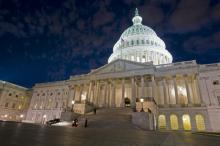
After almost a year as chaplain of the U.S. House of Representatives, which The New York Times called "one of the most reviled congregations in the country," the Rev. Patrick Conroy was back in Portland, Ore., for a few days to meet with his Jesuit counterparts.
Conroy, 61, was a theology teacher at Jesuit High School here when the opportunity to be House chaplain arose. He was sworn in May 25 as the chamber's 60th chaplain. In a recent interview, he talked about the challenges of his job and issued a challenge of his own to American citizens. His answers have been edited for length and clarity.
From Newsweek Magazine:
It’s worrying to think that shareholder democracy is needed to rectify shortcomings in the real thing, yet this week two of the nation’s biggest corporations will give their investors precisely that opportunity. Motions on the ballots at the annual meetings of Bank of America and 3M will act as referenda on the U.S. Supreme Court’s decision in the Citizens United case, which handed companies the same freedoms of speech accorded people. Happily, restricting the use of corporate money in politics isn’t just good for democracy, it’s good business.
DC-based pastor and former Sojourners staff member, Rev. Aaron Graham unpacks what it means to have faith and serve in government for The Washington Post:
It breaks my heart today to see how often politics shapes our faith, rather than faith shaping our politics. Over the years the church in America has become so biblically illiterate that we are often being more influenced by cultural and political trends than we are by the Word of God.
Read his full article here

Politics is a true American idol, and the 2012 presidential election will be a dramatic demonstration of that reality.
Simply put, we create an idol when we ascribe attributes or place hope in persons or things that should belong only to God. People of faith may be tempted to worship at the altar of politics, but make no mistake: The kingdom of God and the kingdoms of politics are never one and the same.
Our worship of God rightly should shape our engagement with politics, but when politics shapes our religion it distorts our service (and worship) of the One True God.

Today, Sojourners' Communications Director Tim King talks with CNN's Lisa Desjardins about politicians and God-talk in this 2012 presidential election season.
From CNN.com:
Is Washington a holy city? It might seem that way, with all the talk about religion and morality in the 2012 election.
But all that God talk may be rubbing voters the wrong way.
"It's getting ugly out there," said Tim King, an evangelical Christian who works for the progressive religious group Sojourners. "There are a lot of Christians who are using their faith as a political weapon, which it's never meant to be."
Listen to Tim's comments on CNN Radio inside the blog.
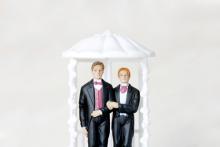
Opposition to gay marriage is significantly lower in 2012 compared to the previous two presidential campaigns, a survey by the Pew Research Center for the People & the Press shows.
For the first time, the level of strong support for gay marriage is equal to the level of strong opposition, researchers report. In the April 4-15 survey, 22 percent of Americans say they strongly favor permitting legal marriage for gays and lesbians; an identical percentage said they strongly oppose it.
In 2008, strong opposition was twice as high as support -- 30 percent vs. 14 percent.

As part of the rollout for "Millennial Values Survey" from Public Religion Research and the Berkley Center, I sat at Georgetown University and listened to a very long list of what pollsters think makes up college-age millennials. I’m in the right age bracket, but I couldn’t stop thinking about what a difference just a few years makes.
I’m part of the millennial generation, albeit at the high end of the spectrum. At 29, my attitudes and behaviors look completely different to those on the lower end. Part of it, of course, is phase of life. I’m a professional, married, with a few life experiences under my belt. Most of the respondents of the survey are in college or recently graduated—half live with their parents.
In discussing the survey results with a 23-year-old friend, we worked through both obvious and subtle differences. Some key characteristics of this cohort, and perhaps ways to engage them, surfaced.
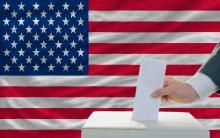
In a previous post about the recent ‘Millennial Values Survey,’ I pointed out that young millennials age 18-24 are becoming disillusioned with institutionalized religion.
It’s an anecdotal truth we’ve been throwing around quite a lot lately, but the survey proves the very clear reality that the newest generation of adults is checking the “unaffiliated” box at a rate of one in four.
But young adults aren’t just showing apathy for religion—it’s politics as well.

For a lot of voters, President Barack Obama’s tenure hasn’t turned out quite as they hoped. On the other side, the presumptive GOP nominee, Gov. Mitt Romney, isn’t the candidate that many voters seem ready to believe in.
Traditional political parties are in decline. In December 2011, Gallup reported that 45 percent of the U.S. population identified as politically independent. At the same time, the direction of our two parties is more and more influenced by political movements like the Tea Party and Occupy Wall Street.
While there is an unprecedented level of money flowing into elections from wealthy donors, corporations and unions, social media has democratized access to fellow voters. You can spend millions of dollars buying airtime on traditional TV stations—but it is entirely possible to craft a compelling message that will reach millions for a relatively small cost.
A politically disillusioned electorate and a huge influx of money for attack ads will be a challenge to our country’s democratic processes. The danger, especially for my generation, is to tune out from political and civic engagement entirely.
The opportunity is post-candidate politics.
Melissa Boteach of Half-in-Ten—the campaign to cut poverty in half in 10 years—is using the Katniss defense against the Ryan budget cuts.
The world that Suzanne Collins paints in the The Hunger Games is one in which only the strong survive. Those that can’t keep up are cut out, kind of like the Ryan budget.
One of the radical things about the ethical agenda that Jesus promoted was the place he offered to the sick, the weak and the weary. He flipped common understanding of who was “deserving” and who was “undeserving” upside down.
The Catholic Bishops have now come out with their concerns about the Ryan budget and how it abandons the poor and the hungry. Take a look at Melissa’s chart, what do you think?

Just a few years ago, Ross Douthat earned the distinction of becoming the youngest regular columnist the New York Times has ever employed. He also has the unique position of being a conservative Christian in the belly of what some Christians might consider the proverbial “beast.”
So, how's that going for him?
“It’s been wonderful,” he told Michael Cromartie, Vice President at the Ethics and Public Policy Center, during an onstage interview at the Q Conference in Washington, D.C. Tuesday evening.
The conversation focused on the themes of Douthat’s new book, Bad Religion: How We Became a Nation of Heretics.
As if conventionally powered drones weren’t bad enough, a report has it that scientists are developing nuclear-powered drones that could stay in the air for months without refueling. In addition to the fact that this would make drones more efficient killing machines, it also increases the dangers from crashes. Drones are especially prone to crashing, and with a nuclear reactor, a crash would be “in effect turning the drone into a so-called dirty bomb.
The project has apparently been put on hold, with a research summary concluding that "none of the results will be used in the near-term or mid-term future," due to political constraints. But with the increasing reliance on drones by the military, I suspect it won’t be long before it’s resumed.

A top Southern Baptist official has accused President Obama and black civil rights activists of using the Trayvon Martin shooting to foment racial strife and boost the president’s re-election chances.
“Rather than holding rallies on these issues, the civil rights leadership focuses on racially polarizing cases to generate media attention and to mobilize black voter turnout,” Richard Land, president of the Southern Baptist Convention's Ethics and Religious Liberty Commission and the denomination’s top public policy official, said on his radio program on Saturday (March 31).
“This is being done to try to gin up the black vote for an African-American president who is in deep, deep, deep trouble for re-election and who knows that he cannot win re-election without getting the 95 percent of blacks who voted for him in 2008 to come back out and show they are going to vote for him again.”
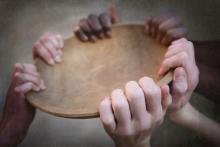
While I believe in the principle of church-state separation, there are times when it is taken too far. Today’s example is a food pantry in Seymour, IN.

New research released today by the Pew Forum shows that the American public are becoming increasingly anxious of the amount of religious language being used by their public officials.
More people now say that there “has been too much expression of religious faith and prayer from political leaders” (4 in 10) than say that there has been too little (3 in 10). This figure is up nearly 10 percent from 2010 figures.
Supporters of former Pennsylvania Senator and presidential candidate Rick Santorum are the least concerned by the use of religious language by politicians, with 55 percent of them believing that there is too little expression of religious faith and prayer by religious leaders. Amongst Democrats or those who lean in that direction, a majority believe that religious language is invoked too often by political leaders.
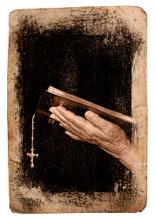
We’ve been hearing a lot in the news media lately about women’s bodies. Just when we thought the messy fight over contraception was over, Democrats and Republicans are butting heads again over renewal of the 1994 Violence Against Women Act, a once widely supported bill that is now being met with opposition from Republicans due to new provisions that “would allow more battered illegal immigrants to claim temporary visas, and would include same-sex couples in programs for domestic violence,” according to the New York Times.
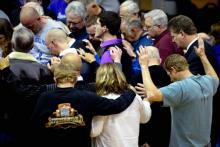
To understand American politics, follow the money. But to understand American goodness and resolve, follow the storms.
Watch towns rally to save children and to provide emergency shelter. Watch people share water and food with strangers. Watch people share chain saws and rowboats. Watch religious communities collect offerings of money and supplies.
Watch people stop work in order to pile sandbags along cresting rivers. Watch hard-hit towns discover their core oneness. All those fears of the dreaded "other" that politicians try to whip up seem to evaporate when storms hit.
When our host led prayers for the victims of the tornadoes, no one asked if they were "our kind of people." They were victims, and that's all we needed to know. While politicians raged across the landscape shouting invectives, rekindling old grudges, stirring pots of fear and distrust, and seeking votes in hardship, actual victims of hardship were joining hands to serve the least of these.
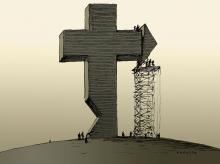
“Church folks are just too political!”
When people are asked why they have decided to leave the church, this has become an increasingly popular response. And, sadly, it is a particularly popular response for those in the 18-29 year old demographic. That we Christians have allowed ourselves to become too political and too partisan is a major contributor to the decline of the church.
Partisanship and its corrosive effects are not a new thing to the culture at large. However, more and more that cultural partisanship is infecting the church and gnawing away at the bonds which are supposed to hold them together. In the process, the church gets hijacked and redeployed for partisan ends, leaving those expecting better from the church disappointed.